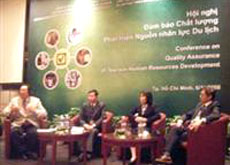Vietnam tourism sector will risk lagging far behind other regional countries and find it difficult to maintain a high growth rate if breakthrough measures are not taken to generate enough qualified personnel, a senior tourism official has said.

"The biggest hurdles to tourism development in Vietnam are the poor quality of tourism products and the failure of local tourist administrators to keep pace with the demands made by rapid growth in the sector," said Nguyen Manh Cuong, deputy director of the Vietnam National Administration of Tourism (VNAT).
Opening the Conference on Quality Assurance of Tourism Human Resources Development held in HCM City on Nov. 6th, 2008 Cuong said the local tourism industry should urgently train a contingent of well qualified and knowledgeable personnel who had managerial skills, national and ethic pride.
"Without drastic measures to ensure the quality and quantity of the tourism workforce, the sector hardly compete in the region and the world in the near future," Cuong said.
"A series of synchronous measures will be taken, such as continuing administrative reforms, increasing promotion, attracting domestic and foreign investments, and diversifying and improving quality of tourist products."
But all these could be realized only if there was a well trained workforce to satisfy tourists’ demand, he said.
Cuong noted several constraints in current tourism training, including inadequate and backward facilities and equipments, lack of skilled teachers as well as poor collaboration between training institutions and the tourism industry.
Four elements – occupational skill and knowledge, good service, foreign language skill and reasonable allocation of labour between areas – would be crucial to meet the critical demands of the tourism industry, he said.
The quality of training must be assured, which would be reflected in the number of graduates having jobs in the tourism industry, he added. Tourism training must be relevant to changes likely to occur as new careers emerge to provide for new developments, including the growth of service apartments, the event and entertainment-management industry, tourism marketing and promotion.
Hans Farnhammer, First Secretary of the European Commission Delegation to Vietnam, said, "Despite the tremendous progress of the tourism sector, challenges remain concerning with the development of new tourist attractions. These include the opening of new national parks for tourists, heritage conservation, environmental protection and taking poverty alleviation into account. The key to success for the implementation of the tourism master plan lies with qualified human resources."
He said the EU was proud to contribute to tourism development in Vietnam by providing more than 10 million euros through the Vietnam Human Resources Development in Tourism Project to provide on-the-job training to a large number of workers.
The co-operation project between the EU and the VNAT aims to increase the standards and quality of the tourism labour force. Cuong said the current task of local tourism sector was to sustain the growth rate and ensure sustainable development.
By 2010, the industry will be targeting from 5.5 to 6 million international tourists and from 25 to 26 million domestic travelers, bringing in revenues of USD 4.5 billion.
The third annual conference attracted 250 domestic and foreign participants.